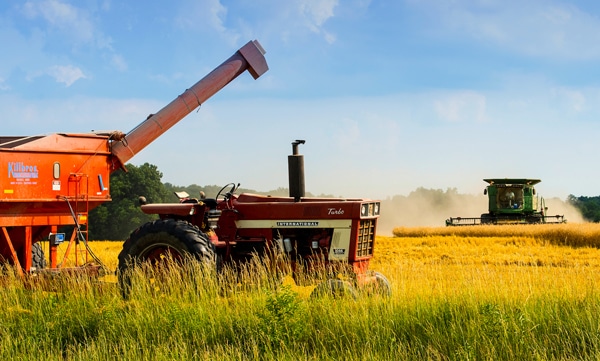Early wheat harvest puts beans ahead of schedule

A good yield of winter wheat is being harvested along Route 3 between Waterloo and Red Bud. Pictured, Dale Haudrich works a combine over the ripened golden wheat on Adrian Crook’s farm earlier this month. (Alan Dooley photo)
The winter wheat across Monroe County has been pushed to maturity and energetic harvesting by the heat that descended in May following an unseasonably cold April.
The wheat harvest is running about 10 days ahead of schedule this year, Gateway FS grain division manager Adam Parker said. It’s called winter wheat because it was planted at the end of the season last fall and emerged this spring.
“The product is pretty good – somewhat variable depending on location,” Parker said.
While the quality is a little less than the past two years, which were record production years, the price is up.
“We saw prices in the $4.30 to $4.50 per bushel range in 2016 and 2017,” Parker noted, adding, “that’s also being driven by drought and a poor harvest in Kansas as well as some problems with outputs in Australia and Russia.”
Relatively good grain output here, and problems elsewhere are in fact pushing wheat prices here above $5.30 per bushel.
Wheat quality depends on several factors. The more disease-free it is, the better. Citizens may have seen crop duster planes and helicopters flying low over fields in recent days, timing applications to minimize funguses and help maintain the wheat’s health during the harvest.
Wheat has to be sprayed at exactly the right time and under the right conditions, while it is blossoming, for this to be effective.
Another factor is test weight. A bushel — 32 quarts — ideally will weigh 60 pounds. Parker is seeing a slight drop from the last two years, with test weights from 60 pounds to 58 pounds. If test weights drop below 58 pounds, farmers may start to see incremental price penalties.
Farm workers who harvest wheat are being seen working late into the night hours. In fact, farmer Terry Liefer said he saw them going to work at 4 p.m. on Memorial Day and working into the dark. They are pushing hard because if the ripened wheat is rained on, this causes swelling of kernels, which in turn results in a lower test weight per bushel — and a potentially lower price.
An added benefit of getting the wheat harvest finished before it rains is that farmers are getting beans planted earlier in the season.
“Beans like heat,” Parker said. “Of course they will need adequate rain as they emerge and mature.”
Another component of the main three field crops across the region is rapidly growing corn.
An old saying is that corn should be “knee high by the Fourth of July.” It has achieved that benchmark by the Fourth of June in many local fields and is growing at a rapid rate in the heat and moist soil.
“We’ll need rain at the right times to sustain that growth,” Parker said.
Prolonged lack of rain can slow, and even end, corn growth as was seen here several years ago when it started well but stopped growing and died before it produced full ears.
Farming is the foundation of Monroe County’s economy. While it sustains many other businesses, it is also fraught with risks. What starts as a good growing season can change rapidly and drastically.
Likewise, crop outputs a continent away can push prices here up or down.





